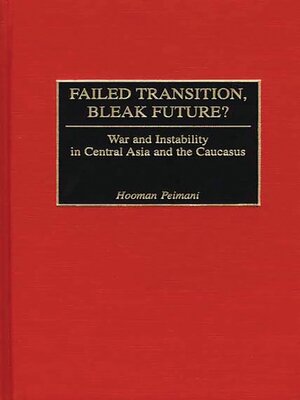Failed Transition, Bleak Future?
ebook ∣ War and Instability in Central Asia and the Caucasus
By Hooman Peimani

Sign up to save your library
With an OverDrive account, you can save your favorite libraries for at-a-glance information about availability. Find out more about OverDrive accounts.
Find this title in Libby, the library reading app by OverDrive.



Search for a digital library with this title
Title found at these libraries:
| Loading... |
Peimani challenges the practical indifference of many Western and non-Western countries with interests in Central Asia and the Caucasus to their plight. Independence in 1991 suddenly worsened all the economic and social problems of the countries of the Caucasus (Azerbaijan, Armenia, and Georgia) and Central Asia (Kazakhstan, Kyrgyzstan, Tajikistan, Turkmenistan, and Uzbekistan). Their failure to address their numerous economic problems and to develop their economies has created a suitable ground for the rise of social and political popular dissent, including ethnic conflicts, in all these multi-ethnic countries.
Concerned about the stability of their political systems, their ruling elites have all opted for authoritarianism. The prevailing intolerance of dissent and the suppression of opposition, political parties have paved the way for the emergence of anti-government extremist ideologies and political groups. The domestic situation has become ripe for the rise of violent political activities and ethnic conflicts, with a great possibility for their escalation to civil wars. The ethnic structure of both the Caucasus and Central Asia makes their development into inter-state wars a strong possibility. The unsettled ethnic and territorial conflicts within and between countries, which turned into wars in the early 1990s, could easily re-emerge. There is a potential for the further escalation of military conflicts in those regions because of the intentional or unintentional intervention of Iran, China, Turkey, Russia, and the United States, which have long-term interests in the two regions. Given the geographical characteristics of the Caucasus and Central Asia as a link between Asia and Europe, war and instability in those regions could destabilize the two continents hosting six declared nuclear powers. Of particular interest to scholars and other researchers involved with Eurasian, Central Asian, and Caucasian countries.
Concerned about the stability of their political systems, their ruling elites have all opted for authoritarianism. The prevailing intolerance of dissent and the suppression of opposition, political parties have paved the way for the emergence of anti-government extremist ideologies and political groups. The domestic situation has become ripe for the rise of violent political activities and ethnic conflicts, with a great possibility for their escalation to civil wars. The ethnic structure of both the Caucasus and Central Asia makes their development into inter-state wars a strong possibility. The unsettled ethnic and territorial conflicts within and between countries, which turned into wars in the early 1990s, could easily re-emerge. There is a potential for the further escalation of military conflicts in those regions because of the intentional or unintentional intervention of Iran, China, Turkey, Russia, and the United States, which have long-term interests in the two regions. Given the geographical characteristics of the Caucasus and Central Asia as a link between Asia and Europe, war and instability in those regions could destabilize the two continents hosting six declared nuclear powers. Of particular interest to scholars and other researchers involved with Eurasian, Central Asian, and Caucasian countries.






